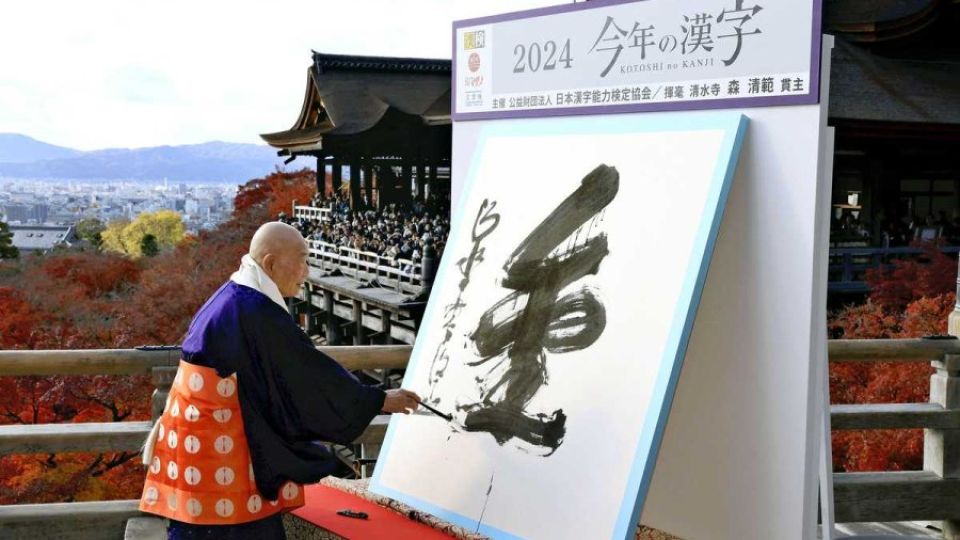January 20, 2025
KYOTO – Several tabletop games inspired by traditional culture and set in Kyoto have been released recently. Their simplicity allows people to enjoy playing without needing specific knowledge. It is hoped that they will play an important role in passing down the culture of Kyoto to the next generation.
Gesture game
Tokyo-based Kodansha Creators’ Lab. developed a prototype of a board game called “NOH MY GOD!” in collaboration with the Kyoto prefectural government in July. Players start by drawing four cards out of a deck of 50 containing topics related to the attractions and specialties of Kyoto, such as Kiyomizu Temple and matcha, and then placing them on the board.
One of the players will try to convey a topic with three different gestures. The other players try to guess which card is being represented and put their pieces on the one they think is correct. The faster a player gets it right, the higher the score they earn.
How could a player convey Kiyomizu Temple?
Maybe they would imitate jumping off something, referencing the famous Japanese proverb “to jump off the stage at Kiyomizu Temple.” Or maybe they would imitate writing kanji with a brush, since the temple is the place where the kanji of the year is announced. There is no one correct gesture.
The player making the gestures has to wear a noh mask. “We want people to become more familiar with noh, but we also want players to enjoy trying to express themselves physically without words or facial expressions,” a representative of the company said.
The company is part of a project to develop tabletop games that incorporate local culture in collaboration with municipalities. “NOH MY GOD!” is the first game created in the endeavor.
“I hope the game becomes a way for people to gain a deeper understanding of Kyoto’s culture,” said Kyoichiro Hirata, who is in charge of development support. “I want to improve the quality even more and then release it.”
Center of industry
Kyoto has deep ties with tabletop games. Nintendo Co., based in Kyoto and better known for its impact in the video game industry, began as a company manufacturing Japanese playing cards called hanafuda. According to statistics from the Economy, Trade and Industry Ministry, the prefecture accounts for around 30% of shipments nationwide by value of manufactured goods in the entertainment and toy manufacturing industries, excluding dolls and figurines.
Finding the setting attractive, Grounding Inc., a Fukuoka-based game development company, established a base in Kyoto in October 2017. It has since launched several tabletop games. Among them are Kyoto Dangan, in which players can simulate sightseeing in Kyoto, and Yokai Bakasuka, a board game inspired by hyakki yagyo, a night parade of 100 demons said to have been encountered on the streets of Kyoto. They have each sold about 2,000 sets. The company has plans to sell these board games abroad.
A person in charge of game development at the company said, “Having a base in Kyoto allows us to create products inspired by unique themes and culture.”
Play by nose
There are also cases of companies in different industries launching tabletop games.
Shoyeido Incense Co., a long-established incense company based in Kyoto, released a set of scented playing cards called Kunkunkun in December last year. The company took part in an industry-government-academia collaborative study to investigate the effects of scents on the brain using samples of the cards about three years ago.
Players try to distinguish between three types of scented cards, matching cards with the same scent or combining three different scents into a set. How the scents are perceived depends on the weather and humidity. The company plans to utilize its advantage as a specialty store and provide different sets of cards.
Kunkunkun is played not only at home but also in senior care facilities, where it is used as a dementia prevention activity.
“We hope people will feel more connected to the familiar scents of everyday life,” said Akiko Koike, a representative of the company. “We hope people discover the depth found in fragrances and the joy of comparing them.”
Tabletop games are characterized by their lower production costs compared to digital games, generally making them more affordable for customers.
“It is interesting to see that [these board games] reflect current social trends, such as the desire to transform oneself through wearing a noh mask or the current demon craze,” said Prof. Toru Yagi of Bukkyo University, who specializes in folklore studies. “I guess they stimulate a longing for the mysterious world of Kyoto culture.”

